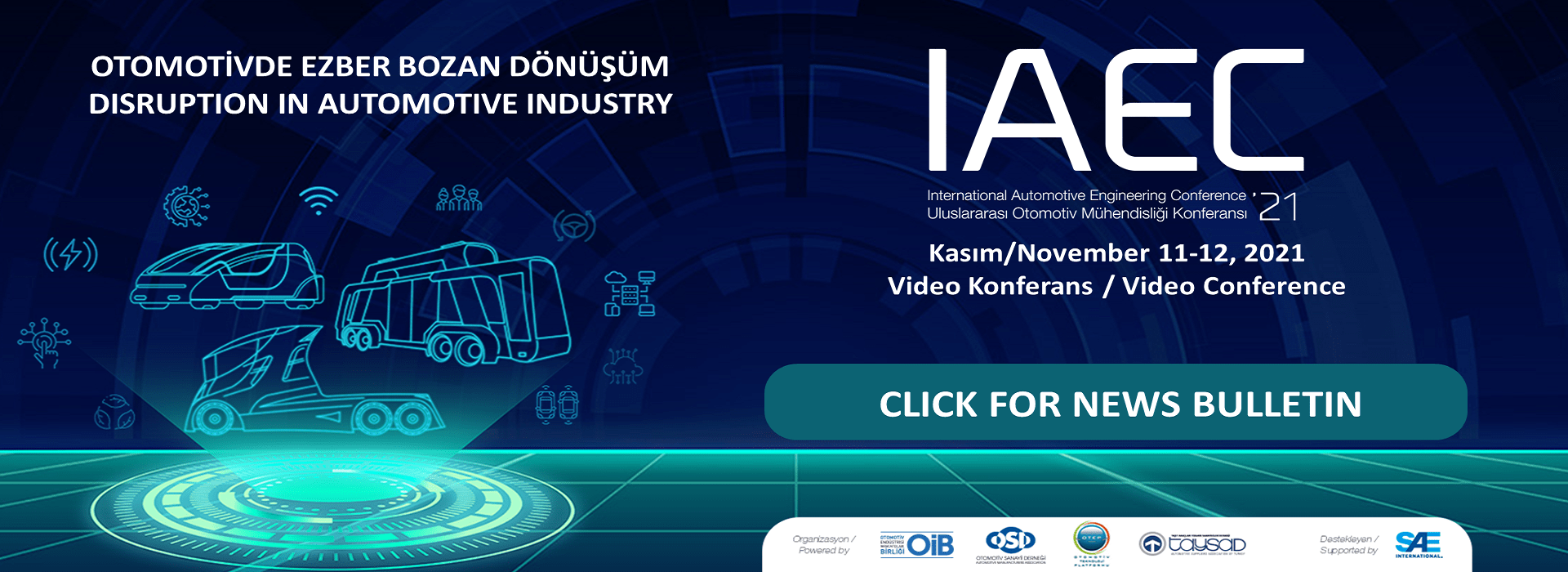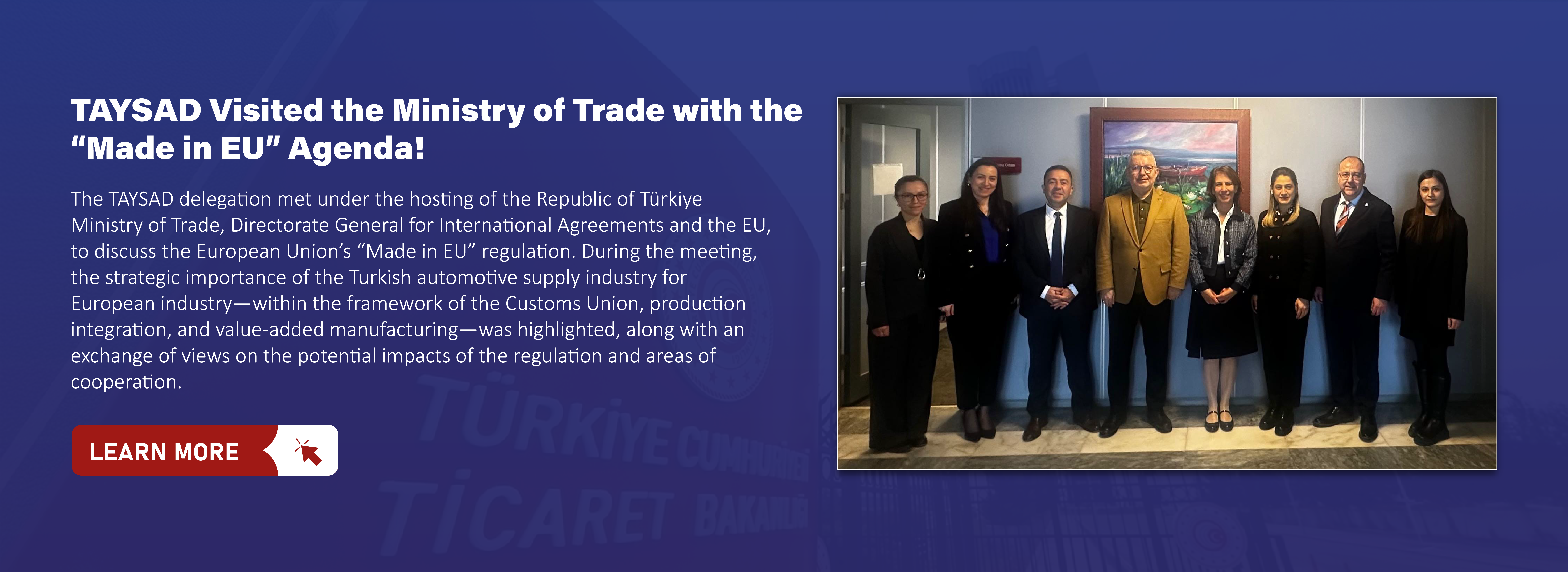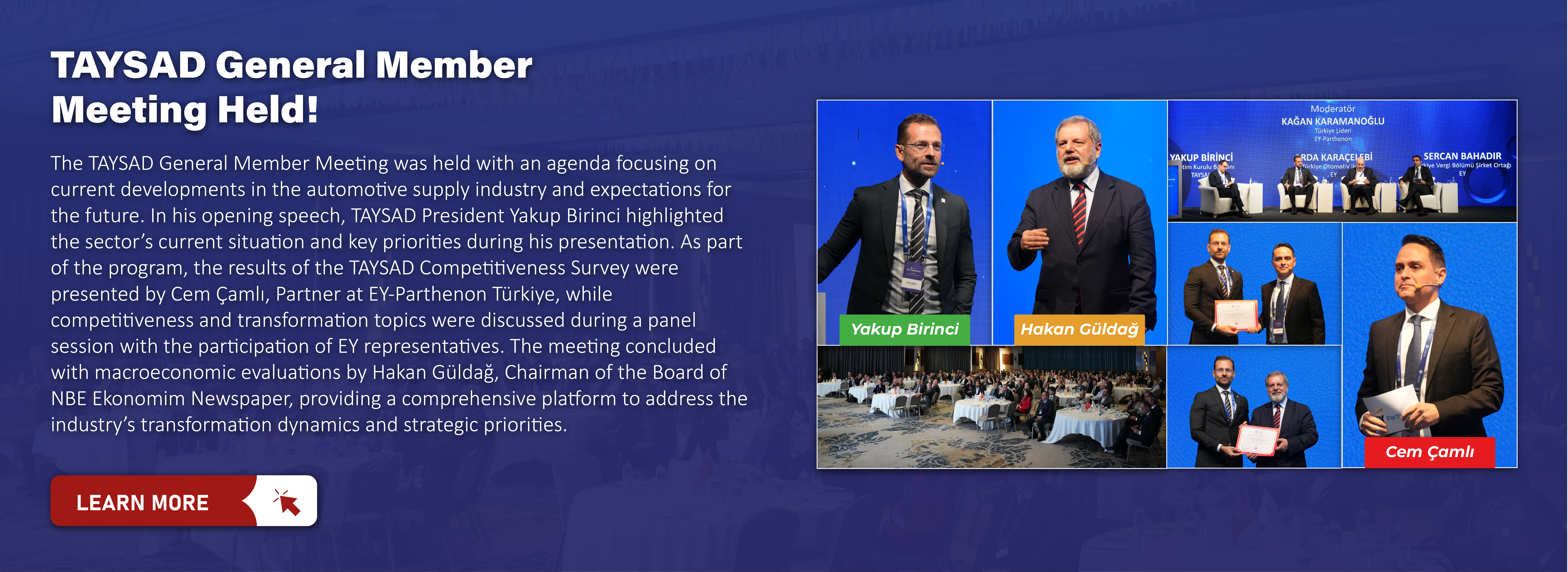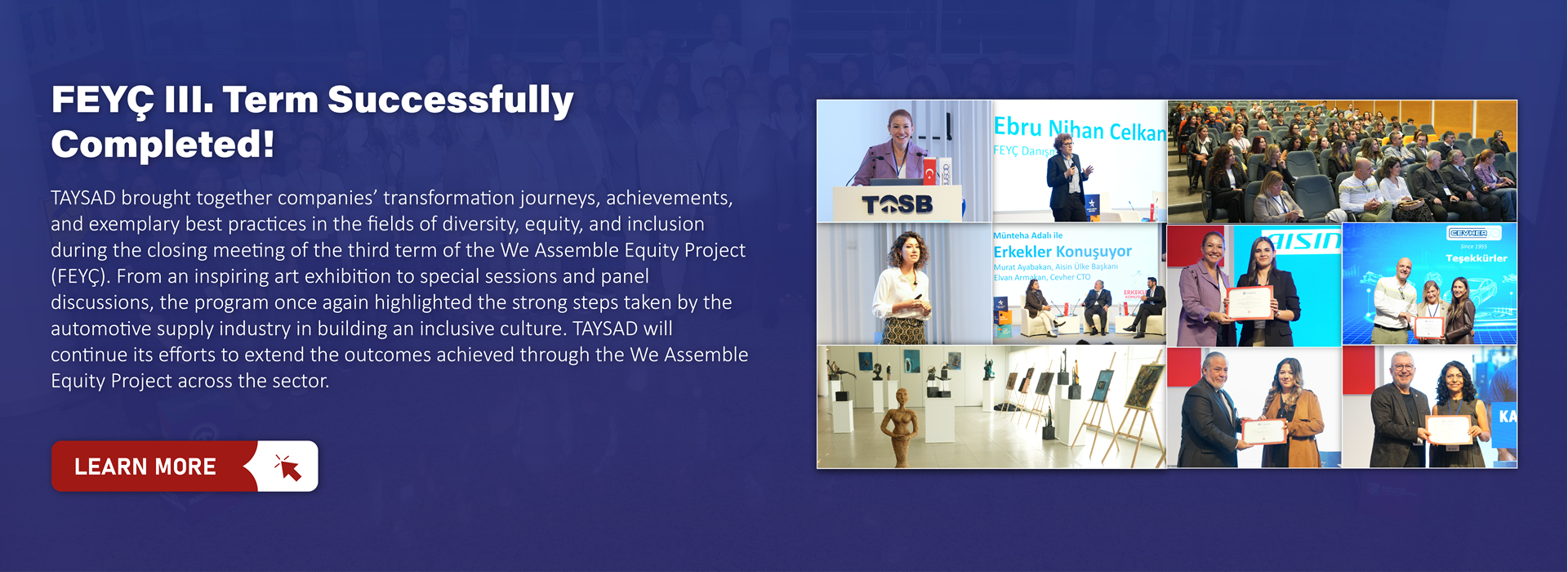
The 6th "International Automotive Engineering Conference" (IAEC) was held this year. Speaking at the conference, Board Chairman of Uludag Automotive Industry Exporters Association (OIB) Baran Çelik said, "We are in a process where we will feel the disruption in the automotive industry to our veins. The automotive industry will overcome this with its entrepreneurs, trained human resources, and competitiveness." Board Chairman of the Automotive Industry Association (OSD) Haydar Yenigün said, "We must invest in engineers and technicians for the next 5-10 years. It is very valuable that Turkey's momentum, (and) the leadership of the automotive industry, are sustainable in this period of change. Board Chairman of the Association of Automotive Parts and Components Manufacturers (TAYSAD) Albert Saydam said, "The goals in the (EU) Green Deal cannot be achieved by electrification. There has to be a different solution." CEO of SAE International Dr. David L. Schutt made striking statements about the roadmap of automotive engineering shaped by the change process.
"International Automotive Engineering Conference" (IAEC) focused on the opportunities and risks brought by the radical change in the automotive industry. The conference was held for the sixth time by Uludag Automotive Industry Exporters Association (OIB), Automotive Industry Association (OSD), Automotive Technologies Platform (OTEP), Association of Automotive Parts and Components Manufacturers (TAYSAD) in cooperation with the American Society of Automotive Engineers (SAE International). The latest developments in the automotive industry were shared at the event, which was held online with the main theme of "Disruption in Automotive Industry".
"The process will be very difficult, but…"
In the first session of IAEC 2021, which started with the Conference Chair Prof. Dr. Şirin Tekinay's opening speech, the topic of "Disruption in Automotive Industry" was discussed. Speaking at the session, OIB Board Chairman Baran Çelik stated that the market should diversify in automotive exports and said, "Europe is the region with the highest environmental sensitivity in the world... The Green Deal was signed, and Turkey is part of the process. In this context, we are in a process where we will feel the disruption in the automotive industry to our veins. The process will be quite challenging, but the industry has overcome difficulties before. The automotive industry will overcome this with its entrepreneurs, trained human resources, and competitiveness." TAYSAD Board Chairman Albert Saydam said that in addition to the part exports, service and workforce exports are also carried out. Saydam said, "Export is not just about selling parts from Turkey to abroad. 160 facilities belonging to 63 TAYSAD member companies abroad have Turkish flag on their gates. This is an important data."
Systems that will motivate the young population should be established!
OSD Board Chairman Haydar Yenigün drew attention to the importance of young people regarding the development of the industry and said, "There has a quite valuable young population, from mobile applications and software coders to calibrators. The important thing is to create an environment that will motivate these people, establish systems, and increase added value. I believe that people are the greatest investment for a sustainable export. That is why we need to invest in engineers and technicians in the next 5-10 years. It is very valuable that Turkey's momentum, (and) the leadership of the automotive industry has achieved, are sustainable in this period of change. I think it is at risk. The added value and export figures we have achieved can only be sustainable by investing in people."
"A new dialogue on zero emissions has begun"
In the session, the changes experienced due to the pandemic were also discussed. Attending the session via teleconference, SAE International CEO Dr. David L. Schutt made statements about the process of change in the industry and the roadmap of automotive engineering. Stating that one of the key issues in this process is the digital transformation, Dr. David L. Schutt said, "Everything is going digital right now. In this way, people have found a way to work together in a virtual environment. And if the organizations are also done well, it speeds up the process. We also face with novel issues. We have faced different issues with different feedback being provided around the world. If we look at the way we do the things that we used to do, for example, a new dialogue, a new focus has started on zero emissions."
"Electrification is an interim solution, not a final one"
Mr. Yenigün also said that the digital transformation accelerated by the pandemic process is an everlasting journey. Mr. Saydam said, "I believe that the electrification was rushed. Those goals in the Green Deal cannot be achieved by electrification. There must be a different solution. But the next nearest goal seems to be electrification. This is an interim solution, not a final one. If we wish to achieve the ambitious targets of 2050, we must find other solutions."
It is necessary to create competitiveness in the sector!
Mr. Çelik also reminded that there is a risk that the domestic share in vehicles produced in Turkey will fall by as much as 30 percent with the disruption in automotive industry and the electric vehicle transformation. Mr. Çelik said, "Both the human and engineer resources required for investments at that point are available in Turkey. However, there are problems regarding the capital required for entrepreneurs and developers to fund this investment." Mr. Çelik added, "The components that will replace the current ones used in the automotive must be produced with the domestic workforce, the domestic engineers engineer, and competitiveness must be created. Otherwise, the automotive industry that would be established through imports will not be able to maintain its competitiveness in the long run, and the industry will lose its leadership as a result of competitiveness."
"There are new expectations from both vehicles and users"
Stating that one of the most important and interesting moments of the automotive industry was experienced, Dr. Schutt said, "There are systems in the vehicle that interact with each other. And there are new expectations from vehicles and users. For example, you think about how a phone can act like a vehicle. In the future this will be even more significant. There is a such system processing that the vehicles interact with the infrastructure and other vehicles. Various skills and vehicle designs are now involved in vehicle infrastructure digitization. So is the electrification." Mentioning the process brought by the introduction of new infrastructures and connectivity, Dr. Schutt continued, "As we get more case examples, things that seem complicated will become easy. We already face with a complex mobility. And when we include electric scooters, the system becomes much more complex but also integrated."
"Yes, you will be dealing with two-wheeled scooters…"
Mr. Yenigün said, "Automotive is now becoming a mobility system. Those who keep up with it will exist in the future. We need to invest in young people, constantly learn, and when we make mistakes, we need to determine and change them. We produce busses, trucks, tractors, automobiles, light commercial vehicles but when it comes to drones, it may seem like it is about aviation, but actually we should know that drone will also be our subject and we should invest in it. As automotive manufacturers, we should also get rid of thoughts such as 'are we going to deal with two-wheeled scooters'. Yes, you will deal with the two-wheeled scooters, you will make an electric version of it and put it in your commercial vehicle, and it will be charged in it."
Data management issue in automotive…
In that session, the investments of technology companies in the automotive sector were discussed. Stating that technology companies have made such a choice for the management of big data, Mr. Saydam said, "The way big data will be used is an important issue, and how it can be protected without violating personal rights is another question. For example, one of the important question marks in automotive is about the owner of the information created by the driver or user of a vehicle and by the person inside the vehicle. "Mr. Yenigün emphasized that the management of data in Turkey is an important question mark. Mr. Yenigün said, "The vehicles will run in communication with other vehicles and infrastructure, along with the driver or the people inside. And it started to be so. But since we could not establish a transparent system about the management of this data, the ball is still in the middle. This is not just about the decision that the countries will make. I mean, we as associations should get together with the organizations across the globe, such as ACEA, and its equivalent organizations in whole Europe and America, and then we should define it so that we can pave the way for this task."
"In one hour, an autonomous vehicle collects data equal to the size of 30 HD movies"
Mr. Çelik said, "I read the reason why technology companies invested in this field in a report. That report demonstrated that 40 percent of the size of the economy created by the automotive ecosystem in the 2030s will be digital services, and they want to get a share from it. There are two important issues in that data: Personal data is one of these two, that connected autonomous vehicles collect all your movements, both the driver and those in the vehicle. And the second one is the cyber security side... As far as I know, an autonomous vehicle collects 25,000 MB of data per hour, which is equivalent to the size of 30 HD movies."
Who is responsible for the data?
Dr. Schutt emphasized that data is an important part of the strategic roadmap to be followed in the automotive industry. Dr. Schutt said, "Vast amount of data is being collected. The one responsible in that area should be determined." Dr. Schutt continued, "When we look from the perspective of transportation management, for example, if there is a problem or a pothole on the road, it is important to be aware of it. The important thing here is that a vehicle passing over it recognizes the problem, can send it to the wider system, and the traffic can be shaped around it. For example, if my vehicle has an emissions problem, this may be a trend and have important consequences for the company producing that vehicle. The studies provide the greatest value in terms of personalization, they are also very important to consider."
The effects of the transformation have been addressed!
IAEC 2021 continued with the session titled "Transformation in Automotive". In that session moderated by experienced automotive journalist Okan Altan, Adastec Corp CEO Dr. Ali Ufuk Peker, AVL Turkey Software and Autonomous Driving Technologies Department Manager Dr. Emre Kaplan, and Prof. Dr. Levent Güvenç from Ohio State University participated as panelists. ICCT "Fuels Researcher" Chelsea Baldino gave a keynote speech before the session titled "Alternative Fuel Technologies". In the "Alternative Fuel Technologies" session moderated by OTEP Chair Ernur Mutlu, AVL Trucks & Busses ICE Power Systems Product Manager Bernhard Rase, Otokar Director of Strategy Development Cenk Evren Kükrer, Prof. Dr. Can Erkey from Koç University, and FEV Consulting GmbH Manager Thomas Lüdiger attended as participants.
Day two at IAEC 2021!
Day two of IAEC 2021 started with the speech of TOGG CEO M. Gürcan Karakaş and then continued with the "Digital Product Development and Production Technologies" session. The moderator of this session was the previous Conference Chair, Prof. Dr. Mustafa İlhan Gökler from METU, and it was attended by Ford Otosan Advanced Production and Product Technologies Leader Elif Gürbüz Ersoy, Capgemini CTIO Jean-Marie Lapeyre, and Fraunhofer Institute for Industrial Engineering Executive Board Director Prof. Dr. Oliver Riedel. The afternoon event started with the opening speech of European Commission CSO Dr. Jorge Perreira and continued with the session titled "Implications of the EU Green Deal". In the session moderated by Prof. Dr. Alp Erinç Yeldan from Kadir Has University; and ACEA Commercial Vehicles Director Thomas Fabian, TEPAV Regional Studies Program Director and TEPAV Global CEO Prof. Dr. Güven Sak, and Şahin Ardıyok from BASEAK Partner were the panelists.
From qualified workforce to data management in automotive!
MÜDEK Founding Member Erbil Payzın's speech took place before the panel titled "Skilled Workforce in Automotive". The panelists of the session moderated by Korn Ferry Honorary President Şerif Kaynar were Mercedes-Benz Türk Human Resources Director Betül Çorbacıoğlu Yaprak, Orhan Holding Human Resources Deputy Head Evrim Bayam Pakis, and ABET CEO Michael Milligan. Tofaş Turkish Automobile Factories Commercial Solutions Platform Manager Haydar Vural moderated the session on "Data Management and Artificial Intelligence in Automotive". Among the speakers of the session were Toyota Motor Europe Software Project Manager Berat Furkan Yüce, AWS Technology Officer Hasan Bahri Akırmak, Related Digital CEO Sedat Kılıç, and OREDATA CTO Cenk Okan Özpay. IAEC 2021 was concluded with the speech of Prof. Dr. Şirin Tekinay.





